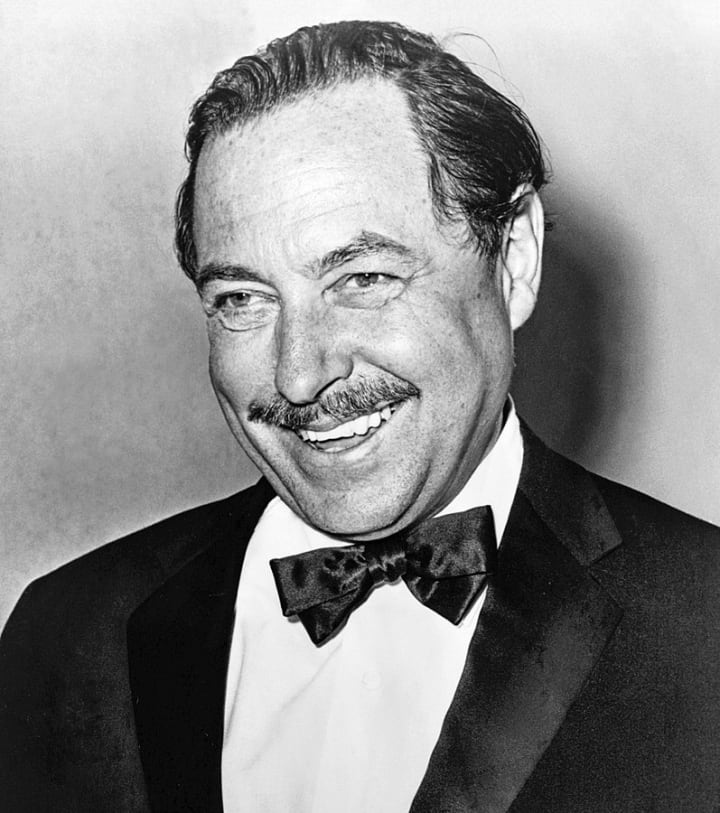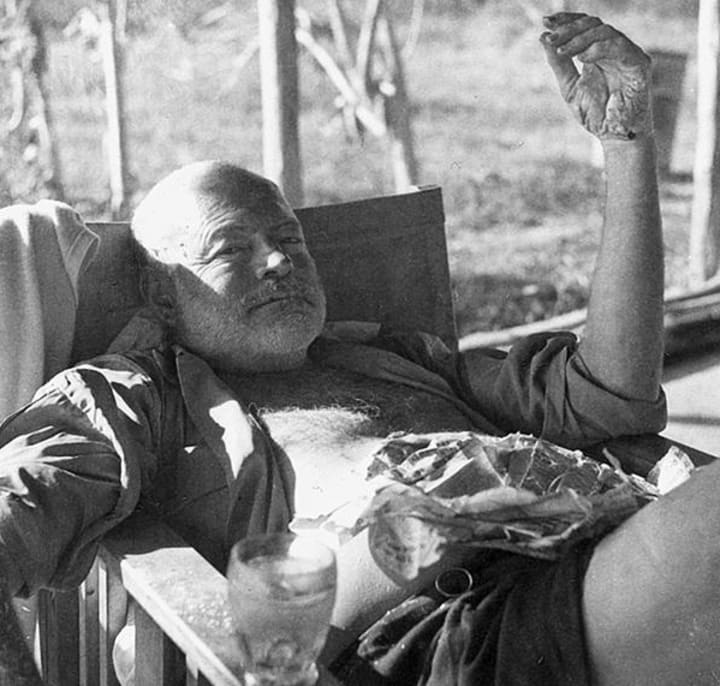Famous Writers Who Were Alcoholics
The tortured artist is something of a cliché, but these writers who were alcoholics reveal the sad truth behind the stereotype.

The relationship between writers and alcohol has historically been profoundly widespread, leading modern authors like Olivia Laing to write their own essays and books about the phenomenon, as Laing did with her 2013 publication, The Trip to Echo Spring: On Writers and Drinking, which discussed the relationship between creativity and drinking. While many authors were teetotalers or at least had a casual relationship with alcohol, the 20th century brought about a slew of talented writers who were alcoholics.
F. Scott Fitzgerald

Photo by JayHenry on Wikimedia.org
F. Scott Fitzgerald is practically the patron saint of all writers who were alcoholics. The defining author of the Jazz Age in the 1920s and 30s, Fitzgerald's lifestyle closely mirrored those of the characters in his many successful novels like The Great Gatsby and This Side of Paradise. In fact, many critics have noted that Tender Is the Night is likely a thinly-veiled account of Fitzgerald's own experience with alcoholism, financial struggles, and mental illness.
John Berryman

Public Domain Photo
John Berryman was an American poet and one of the most important figures in the Confessional poetry movement, which features extremely personal writings in the first person. Fitting for a Confessional poet, Berryman experienced severe trauma in his life. When Berryman was 11 years old, his father killed himself. This experience haunted the poet and fueled his own life with alcoholism and depression. Over the course of his life, John Berryman was hospitalized for alcohol abuse on multiple occasions. Ultimately, it was not the alcohol that killed him, however. Berryman took his own life in 1972 by jumping off a bridge.
Dorothy Parker

Public Domain Photo
Dorothy Parker, American satirist, was best known for her status as a founding member of the Algonquin Round Table, which was a group of New York City-based writers and critics. Though she considered herself merely a "wisecracker," Parker's talents as a writer are well-documented in her numerous New Yorker-published literary works and the two Academy Award nominations she received for screenwriting. Despite an early era of productivity, Parker's alcohol abuse peaked in the 1950s, contributing to her divorce from her husband and causing her work to become increasingly erratic. By the 1960s, Parker was no longer writing anything notable, and she died in 1967 of a heart attack.
Tennessee Williams

Public Domain Photo
Tennessee Williams was undoubtedly one of the most important American playwrights of the 20th century. His most famous works, A Streetcar Named Desire and Cat on a Hot Tin Roof both received Pulitzer Prize awards. Both of these plays referenced alcoholism, homosexuality, and mental illness, all of which were defining aspects of Williams's life. Tennessee Williams had a troubled childhood and an alcoholic father, facts which provided fuel for some of Williams's greatest works while also sadly contributing to Williams's own future addictions. His alcohol and drug abuse peaked in the 1960s, and Williams did not produce any well-received material again until his death in 1983.
Truman Capote

Public Domain Photo
Truman Capote was a successful novelist and short story writer who, like many of the writers on this list, was active in the mid-20th century. The famed author of such literary classics as In Cold Blood and Breakfast at Tiffany's was renowned for his status as a celebrity and socialite. This jet setting lifestyle brought along its fair share of recreational drug and alcohol use, but in Capote's case, this spilled over into addiction and abuse. In particular, researching for the journalistic true crime novel In Cold Blood, indisputably Capote's magnum opus, took a serious personal toll on the author, notably becoming one of the most famous books written by alcoholic authors. Ultimately, as with so many other ill-fated authors, Capote succumbed to these vices at a relatively young age, dying in 1984 at age 59 due to liver disease.
William Faulkner

Photo by Gary Bridgman on Wikimedia.org
William Faulkner is one of the most celebrated American authors of all time, especially when it comes to southern literature. Faulkner spent the majority of his life in Mississippi, which also forms the setting for many of his works, which include classics like The Sound and the Fury, Light in August, and the short story A Rose for Emily. Compared to other writers who were alcoholics beyond a shadow of a doubt, Faulkner's relationship with alcohol was more complicated. While not a habitual alcohol drinker—at least when he was writing—Faulkner had a habit of binge drinking after finishing a project, which typically lasted until he passed out.
Ernest Hemingway

Public Domain Photo
Ernest Hemingway is perhaps the most notorious of all writers who were alcoholics. The famed author of A Farewell to Arms and The Old Man and the Sea spent much of his life in the tropical locales of Key West, Florida, and Havana, Cuba. It was Cuba where Hemingway established his lasting legacy of being a heavy drinker by regularly imbibing more than a dozen daiquiris at a time. He is even credited with inventing a variant of the daiquiri now called the Hemingway Special. The cocktail includes double the normal amount of rum, and also includes grapefruit juice and maraschino liqueur in addition to the requisite limes.
Dylan Thomas

Photo by Ham on Wikimedia.org
Dylan Thomas was a Welsh modernist poet known for such iconic works as Do Not Go Gentle into That Good Night. Though Thomas found fame in his native Wales as well as in the United States, his crippling alcoholism consumed much of his life, and he died before he turned 40. Dylan Thomas was known for being a heavy drinker in his youth, but he truly became a slave to the bottle at the onset of the second World War, when many of his friends went of to war, and he himself was fearful of conscription. Ultimately, Thomas died of alcohol poisoning in 1953.
Charles Bukowski

Photo by Michael Mroczek on Unsplash
Henry Charles Bukowski, a realist poet, author, and columnist, was born as Heinrich Karl Bukowski in Germany in 1920. Though he would spend the majority of his life in Los Angeles, his German ancestry would haunt him during World War II. Unlike many other writers who were alcoholics, Bukowski appeared to be well aware of his alcoholism, even saying of alcohol that, "this is going to help me for a very long time." Charles Bukowski began drinking in his early teens as a means of coping with his rough integration into American society. Alcohol use would even become a common theme in his works of dirty realism, almost shaping the way of how alcoholism shaped his American Dream. Also unlike many of the alcoholic writers on this list, Bukowski's death was not a direct result of his alcoholism: He died of leukemia in 1994.
Patricia Highsmith

Photo by Open Media Ltd on Wikimedia.org
Patricia Highsmith is perhaps best known for her Tom Ripley character. The character featured in a series of five novels by Highsmith and gained particular notoriety upon the release of a 1999 Hollywood film adaptation of the series' first entry, The Talented Mr. Ripley. Highsmith was plagued by a number of ailments throughout her life; including depression, anorexia, anemia, and lung cancer. Highsmith's heavy drinking and smoking were her coping methods, as well as a central cause for many of these ailments. Particularly near the end of her life, Patricia Highsmith's alcohol abuse worsened, as did her rejection of society and her persona as a general misanthrope.
About the Creator
Joseph D. N. Kendrick
Writer of words. Haver of cats. joeykendrick.com
Enjoyed the story? Support the Creator.
Subscribe for free to receive all their stories in your feed. You could also pledge your support or give them a one-off tip, letting them know you appreciate their work.






Comments
There are no comments for this story
Be the first to respond and start the conversation.